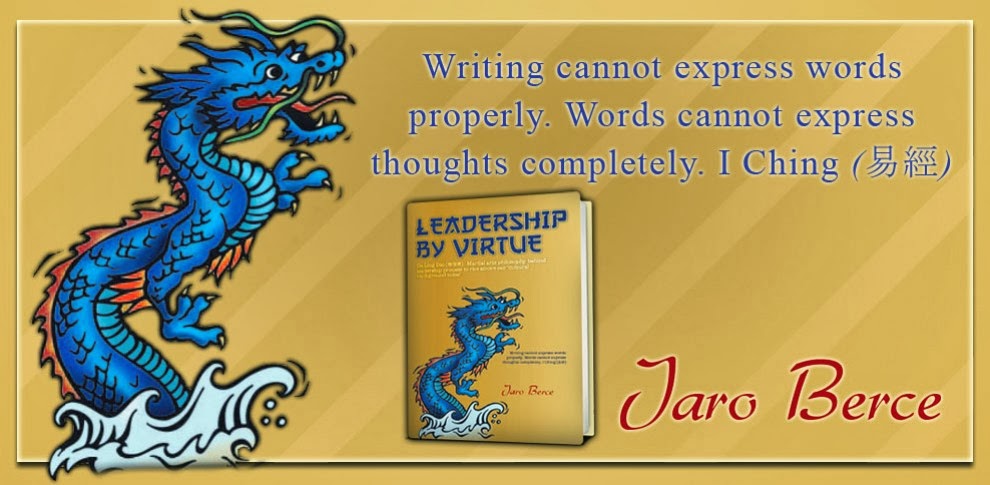High virtue by obliging not acquires moral force.
Low virtue obliges always and thus lacks moral force.
High virtue neither strives nor acts for its own ends.
Low virtue does not strive but acts for its own ends.
 Dào is usually translated as way, road, channel, path, doctrine, or line and by Chinese opinion cannot be obtained as virtue cannot be approached. The legendary Chinese sovereign and cultural hero Yellow Emperor (reigned from 2.696–2.598 BE) said that once Dào is lost, virtue arises; once virtue is lost, humaneness arises; once humaneness is lost, righteousness arises; once righteousness is lost, formalism arises. But formalism is the flowery representation of Dào and the beginning of disorder.
Dào is usually translated as way, road, channel, path, doctrine, or line and by Chinese opinion cannot be obtained as virtue cannot be approached. The legendary Chinese sovereign and cultural hero Yellow Emperor (reigned from 2.696–2.598 BE) said that once Dào is lost, virtue arises; once virtue is lost, humaneness arises; once humaneness is lost, righteousness arises; once righteousness is lost, formalism arises. But formalism is the flowery representation of Dào and the beginning of disorder. So, people long ago figured out that you just cannot contradict Nature. They did not have the tools that we have today. Those ancient days were days of kings, knights, and such, all aiming to be chivalrous. This has long passed away with machine guns and other artillery. Now it doesn't matter if you are strong and durable as all can be overcome with sophisticated tools. But then it mattered. Therefore, it was necessary to learn and accept what your capabilities were. This guided you to preserve your energy and behave in correspondence with it in order to win a fight. Then martial arts straightforward theme where: strategy, knowledge, power, and other needed elements. They were carefully studied to give a feebler person or army a chance to win. For that reason, to work with Nature, to use less energy, to gain more power, and to cover your weakness was the primary occupation. And the wú wéi principle just teaches it!
 The prime example for wú wéi application can be also found in the Bruce Lee movie “Enter the Dragon.” There is an interesting sequence when on the boat going to the island where the Gōng Fu competition was taking place Lee was asked by one of the competitors what is his style of fighting. To which Lee replied that it could be called a style of fighting without fighting! The competitor made fun of Lee and asked him to illustrate how this fight without fighting can be performed. But Lee suggested that it can be illustrated later. Nevertheless bully continued to pressure Bruce to demonstrate it. To which finally Lee replied: ‘Don’t we need more room?’ and proposed to go by a small boat to the nearby island’s beach. The competitor, eager to fight, jumped into a small boat, and in that moment Bruce Lee just pushed the small boat and let it drift away with the competitor alone on board!
The prime example for wú wéi application can be also found in the Bruce Lee movie “Enter the Dragon.” There is an interesting sequence when on the boat going to the island where the Gōng Fu competition was taking place Lee was asked by one of the competitors what is his style of fighting. To which Lee replied that it could be called a style of fighting without fighting! The competitor made fun of Lee and asked him to illustrate how this fight without fighting can be performed. But Lee suggested that it can be illustrated later. Nevertheless bully continued to pressure Bruce to demonstrate it. To which finally Lee replied: ‘Don’t we need more room?’ and proposed to go by a small boat to the nearby island’s beach. The competitor, eager to fight, jumped into a small boat, and in that moment Bruce Lee just pushed the small boat and let it drift away with the competitor alone on board!The wú wéi could therefore be paraphrased as ‘what fits the moment’ and ‘spontaneous action without wasted movements.’
What about wú wéi in leadership?
Today the Western impression of the word is that it stands for stillness while you prepare or start or finish an action and you are, in spite of everything, in control. This is also mirrored in leadership teaching: to control or to be efficient or effective only for the capital. But a superior leader does not need stillness as she/he is in line with the flow of the company. She/he knows that strategic choices foreclose some options, while inaction preserves others, and there are always some that are to be lost. It is the way of wú wéi from martial arts where it is essential to be “spontaneous in action.” Only then, during the action time, it looks as nothing has been done.


No comments:
Post a Comment
Note: Only a member of this blog may post a comment.